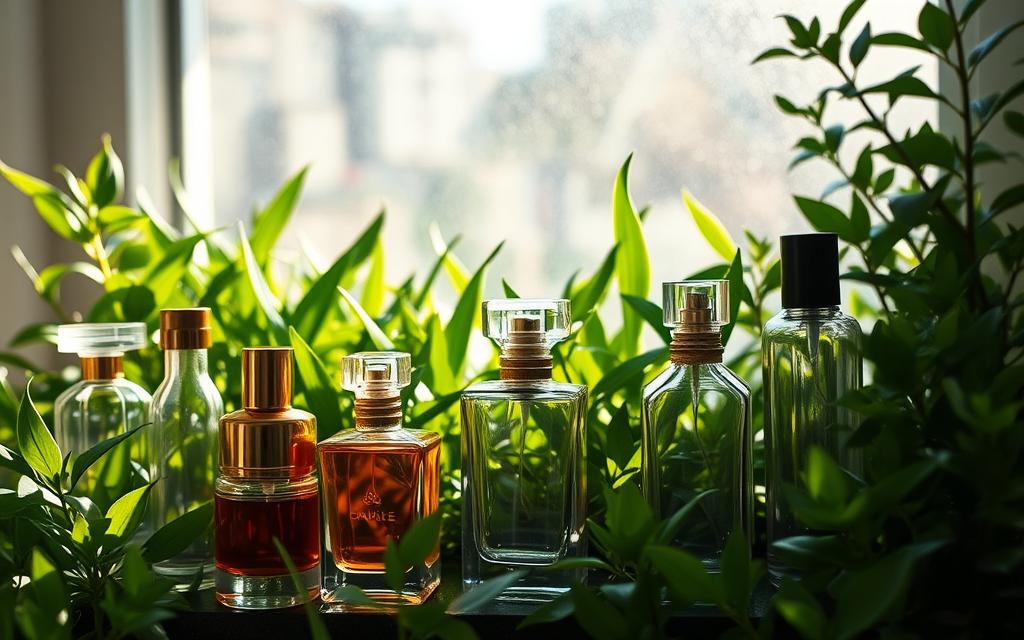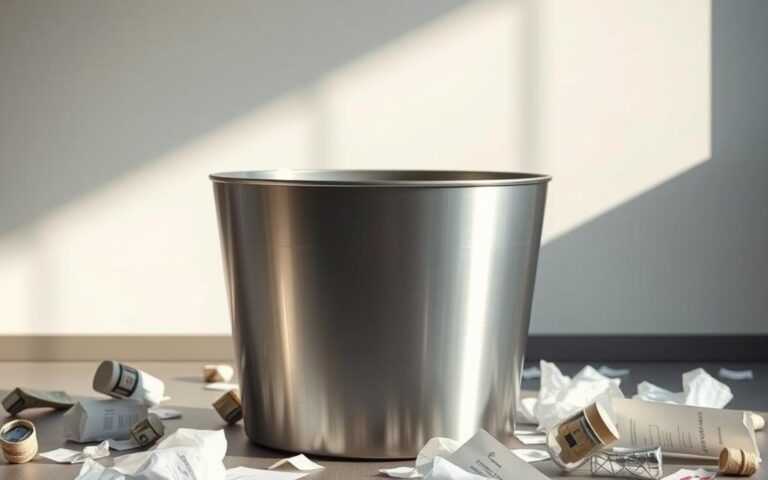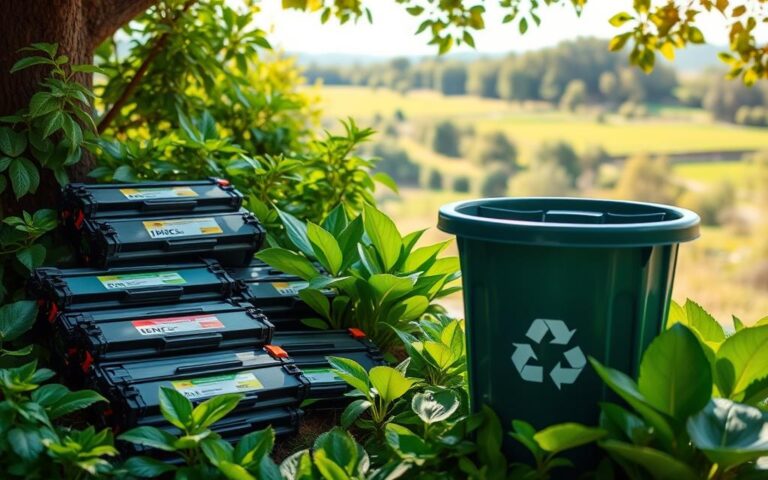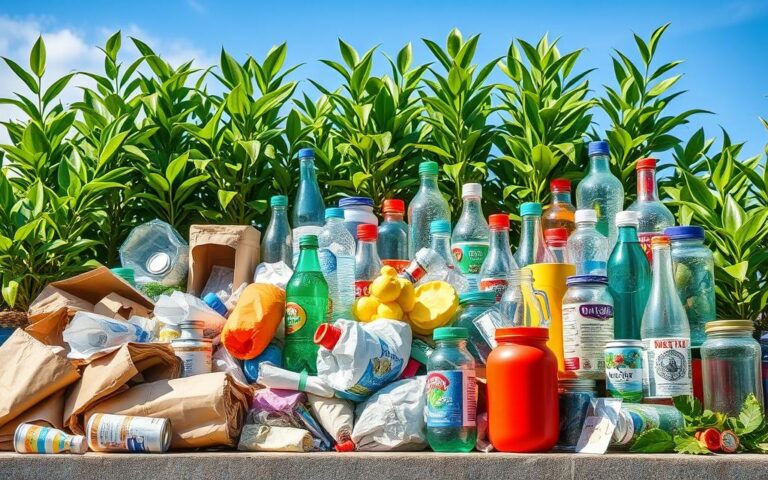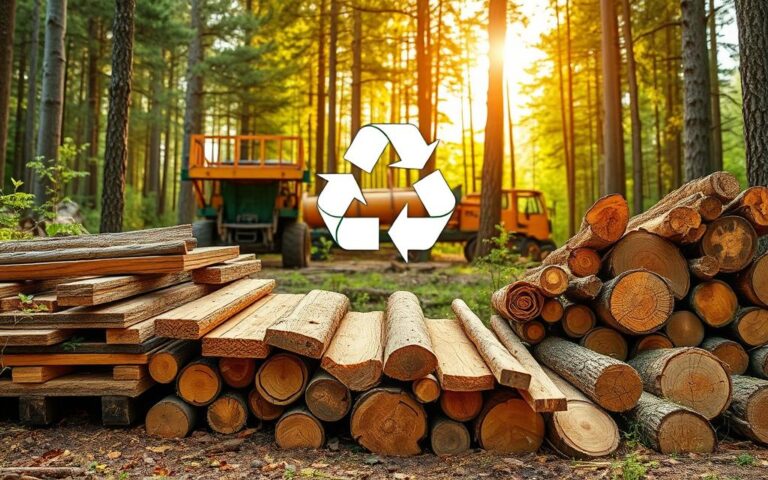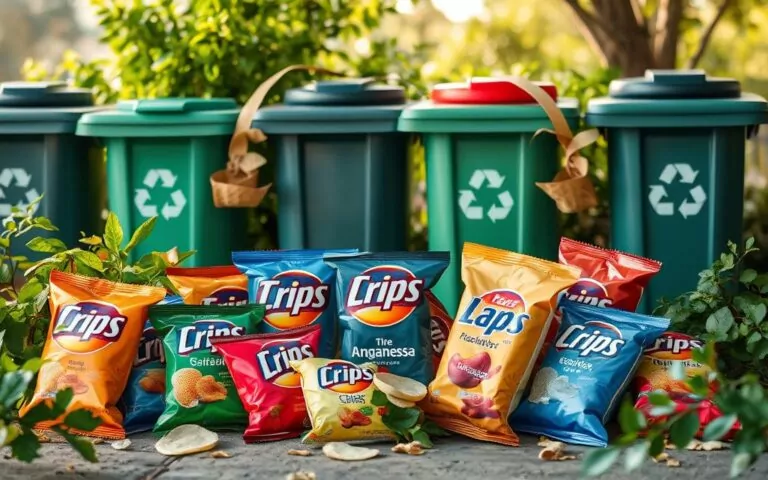Can You Recycle Perfume Bottles? Tips for Disposal
The beauty industry is booming, making it crucial for buyers to think green. Many wonder if they can recycle perfume bottles. Knowing the right way to recycle them helps the planet and reduces waste. Because glass can be recycled forever, the way we dispose of perfume bottles matters a lot. This guide will show you how to recycle or upcycle your old perfume bottles. It aims to prevent them from adding to the waste problem.
Understanding the Importance of Recycling Perfume Bottles
The beauty industry adds a lot to global waste, making it vital to recycle perfume bottles. These bottles are often made of glass, which we can recycle again and again without harming its quality. This is a great chance to make the industry more sustainable.
Materials like PET and PP are recyclable, as are metal parts like spray mechanisms. Big brands like L’Occitane, Kiehl’s, and Estée Lauder have started recycling schemes. This shows they’re serious about cutting their environmental impact.
In places like Germany and Sweden, recycling rates are high thanks to good systems and people’s help. But, throwing bottles away carelessly can really hurt wildlife and the environment. Plastics can take ages to break down, releasing dangerous chemicals.
Some perfume bottles, especially fancy ones, might need special treatment. Upcycling, or creative reuse, reduces waste and gives these items a new purpose. For tips on how to dispose of perfume bottles correctly, check out this resource focused on sustainable practices.
By recycling perfume bottles, we save natural resources, energy, and lessen the trash going to landfills. It’s a key step towards a more sustainable future.
Can You Recycle Perfume Bottles?
Recycling perfume bottles helps save resources and protect our planet. These bottles can be made from clear, coloured, or specially treated glass. Knowing the types of glass helps figure out if they can be recycled. Even though glass is usually easy to recycle, coloured or treated bottles pose challenges. This is because removing dyes and coatings needs extra steps. Also, crystal bottles might not be recyclable in your area’s programme.
Types of Glass Used in Perfume Bottles
Perfume bottles come in different glass types. Each type affects how they are recycled:
- Clear glass: Mostly recyclable in many programmes.
- Coloured glass: Might need special processes due to the dyes.
- Crystal glass: Often cannot be recycled like other glasses.
Besides glass, perfume bottles may have parts made of plastic and metal. These include recyclable materials like PET and aluminium. Preparing these bottles properly before recycling makes the process more efficient.
Recycling Symbols and Their Significance
Looking for recycling symbols on bottles is important. These symbols tell you if a bottle can be recycled and what materials recycling centres take. Checking for these symbols ensures your recycling efforts are eco-friendly. By following your local recycling programme’s advice, you can help recycle perfume bottles effectively and reduce waste.
Steps to Properly Dispose of Your Perfume Bottles
Getting rid of perfume bottles the right way involves a few steps. It’s important to follow these to look after the environment and keep in line with local rules. Here’s what you need to do.
Removing Non-Recyclable Components
To recycle, first take off any parts that can’t be recycled. Most perfume bottles come with plastic tops, metal parts, or spray bits. These might not be okay for your local recycling centre. It’s a good idea to check what each part is made of and separate them. This makes it easier to recycle the rest.
Cleaning the Bottle Effectively
Cleaning perfume bottles well is key for recycling. Leftover smells can mess with the recycling process. Begin by washing the bottle in warm water to get rid of any liquid. To deal with tough scents, vinegar can help make it smell fresh. Make sure the bottle is clean and dry before recycling.
Contacting Local Recycling Facilities
Different places have their own rules for recycling perfume bottles. It helps to check with local recycling spots to know their rules and what materials they take. Some places might have special programs for recycling beauty products. This means you can recycle your bottles properly.
Alternatives to Recycling: Creative Uses for Old Perfume Bottles
Turning old perfume bottles into something new offers many creative and practical uses at home. We’ll look at decorative ideas, fun DIY perfume bottle projects, and how donating them can make a difference.
Using Bottles for Decorative Purposes
Empty perfume bottles can become beautiful decorative pieces. Their unique designs and shapes can make your space look better. Many collectors love these bottles for their style, keeping them for their looks. By putting beads or glitter in them, you can easily add a special touch to your decor.
DIY Projects You Can Try
Starting DIY perfume bottle projects is enjoyable and fulfilling. Here are a few ideas:
- Air Fresheners: Make your own air fresheners by reusing old perfumes.
- Scented Handkerchiefs: Spraying old perfume on handkerchiefs can make them smell nice.
- Car Fresheners: Improve your car’s smell by using perfume on the seats or fabric.
These projects give your old bottles a new purpose and help decrease waste.
Gifting or Donating Unused Bottles
Giving away perfume bottles is a generous act. Charities, women’s shelters, and nursing homes often need these products. A large number of people enjoy re-gifting or donating perfumes. This brings happiness to both the giver and receiver. Companies like Fragrancex and Origins have programs for recycling or donating cosmetics, helping extend their use and bringing joy to others.
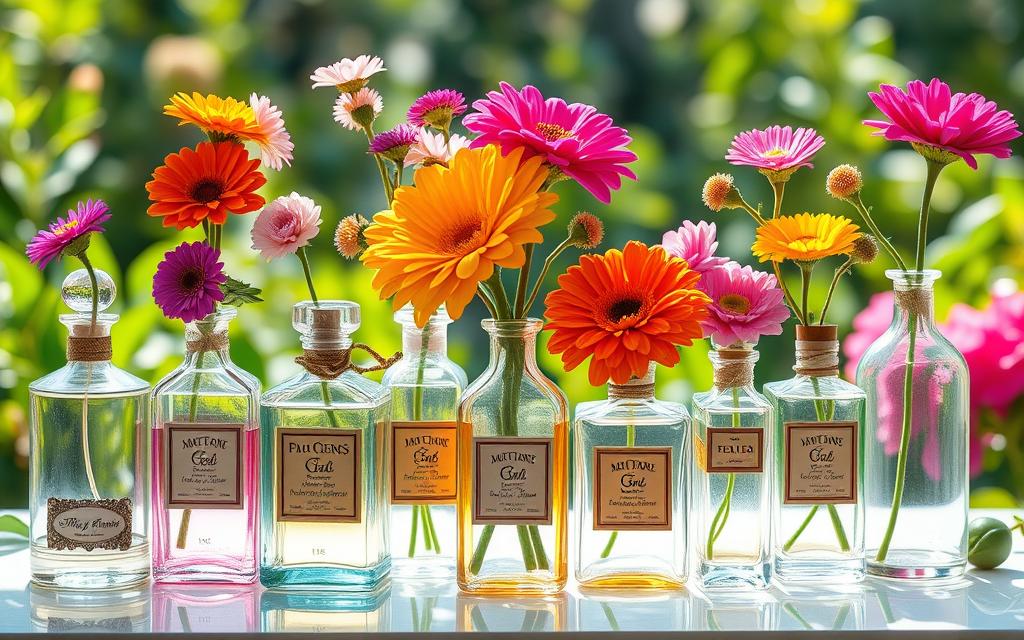
Local Recycling Guidelines for Perfume Bottles
Knowing how to recycle perfume bottles right is key. Different places have their own rules for accepted materials. Always check with your local recycling centre. You need to know their rules for glass and plastic.
Checking Accepted Materials with Your Recycling Centre
It’s vital to know what your recycling centre will take. Usually, plastic marked 1, 2, and 5 is okay if it’s bigger than your fist. For numbers 3, 4, 6, and 7, they need to be a certain size too. Always check ahead as some places have special rules.
Sorting by Colour and Material
Sort your perfume bottles by colour and what they’re made of. This helps recycling work better. Some places prefer clear or green glass. Knowing what your area takes can make recycling more effective.
Understanding Manufacturer Return Policies
Some makers of perfumes help by recycling too. They might have a manufacturer recycling policy that rewards you for returning bottles. For example, Pact has a mail-back scheme for the US and Canada. Checking these options helps the planet and keeps bottles out of landfills.
| Plastic Number | Size Requirement | Accepted? |
|---|---|---|
| 1 | Greater than yogurt cup | Yes |
| 2 | Greater than yogurt cup | Yes |
| 3, 4, 6, 7 | Greater than 2″ x 2″ or yogurt cup | Yes |
| Others | Not applicable | No |
Being proactive with recycling helps us all. It makes our future more sustainable. For more tips on recycling perfume bottles, check the guide here.
Environmental Impact of Proper Perfume Bottle Disposal
When we dispose of perfume bottles properly, we help the planet. Not everyone knows their actions matter a lot in waste reduction. By recycling and carefully throwing away materials, we work towards a greener future.
Reducing Plastic Waste Through Responsible Disposal
Even though glass can be reused many times, most perfume bottles have colours or special coatings. This makes recycling harder because the glass must be cleaned of dyes and finishes. The plastic parts, usually PET or PP, can be recycled but often end up in rubbish dumps, lasting hundreds of years.
Thrown away perfume bottles can damage animals and their homes. In countries like Germany and Sweden, high recycling rates are the norm thanks to good systems and people who help out. Australia, however, struggles and makes over 5.6 million tonnes of dangerous waste a year, harming the environment.
The Role of the Beauty Industry in Sustainable Practices
Big brands like L’Occitane, Kiehl’s, and Estée Lauder have started programs to bring back used bottles. Mugler offers refills, showing that the beauty sector is getting more eco-friendly. This shift towards better practices shows people are aware of packaging’s effects on nature.
Brands focusing on being greener not only cut down on waste but also win customer support. They prove that care for the environment and beauty can go hand in hand. This approach attracts consumers who care about the earth, bringing a fresh outlook to the beauty market.
| Material | Recyclable | Challenges |
|---|---|---|
| Glass | Yes | Colour/treatment processing |
| Plastic (PET, PP) | Yes | Long decomposition time |
| Metal (Aluminium, Stainless Steel) | Yes | Minimal compared to glass |
By understanding this, we can all choose better. Supporting eco-friendly brands and disposing responsibly makes a big difference. Together, we can make the beauty industry cleaner and more sustainable.
Challenges in Recycling Perfume Bottles
Recycling perfume bottles has its hurdles for both buyers and recycling plants. Not all glass bottles are easy to recycle, a fact often ignored. This reality is especially true for perfume bottles with their unique needs.
Common Misconceptions about Glass Recycling
Many think all glass is the same in recycling, but that’s not true. Glass perfume bottles can be recycled, but their colour and treatment matter a lot. Clear glass is simpler to recycle than coloured or opaque ones found in perfume bottles.
These colours make recycling hard for normal systems. Moreover, high-end perfumes may use plastics or materials like leather and porcelain, complicating recycling.
Dealing with Contaminants in Glass Recycling
Contaminants in recycling glass is a big problem. Leftover perfume can stop recycling plants from processing bottles. That’s why it’s important to clean perfume bottles before recycling them.
Cleaning helps reduce environmental harm and tackles recycling barriers. Now, many famous perfume brands are starting their recycling schemes. They aim to make the process smoother and teach people how to dispose of bottles correctly.
Conclusion
Understanding how to recycle perfume bottles is key for a sustainable beauty industry. We all have the power to help the environment with the right disposal choices. By choosing to recycle, repurpose, or use manufacturer take-back schemes, we can reduce waste and help our planet.
Many perfume bottles are made from materials like glass and plastic that can be recycled. But there are challenges, such as coloured glass or parts that can’t be recycled, that we need to know about. By following the tips in this article and finding new uses for old bottles, we can cut down on pollution and save resources. This helps support recycling efforts everywhere.
It’s our duty to use eco-friendly ways to dispose of our unused perfume bottles. This way, they help the planet instead of harming it. By making smart choices and thinking of new uses for our bottles, we can make a big difference in protecting the environment.
FAQ
Can all perfume bottles be recycled?
Not every perfume bottle can be recycled. Most glass bottles are okay, including those of different colours. But, crystal bottles often aren’t accepted. It’s best to check with your area’s rules first.
How should I clean my perfume bottles before recycling?
Clean your perfume bottles well with water first. To get rid of strong smells, try using vinegar. Remember to take off any parts that can’t be recycled, like plastic lids, before you recycle them.
What recycling symbols should I look for on perfume bottles?
Check for the recycling symbol on bottles to see if they can be recycled where you live. This symbol explains the bottle’s material. It tells you if your local centre will accept it.
Are there creative ways to repurpose old perfume bottles?
Yes! You can turn old perfume bottles into decorations, vases, or crafts. They can make your home look more beautiful. It’s a great way to be eco-friendly too.
How do local recycling guidelines vary for perfume bottles?
Recycling rules change from place to place. Some places might only take certain glass types. Always check with your local recycling centre to know what they accept and any special rules.
What is the environmental impact of recycling perfume bottles?
Recycling perfume bottles cuts down on waste and pollution. It saves resources too. By recycling, you help make our planet healthier.
What challenges are faced when recycling perfume bottles?
The main issues are thinking all glass can be recycled and bottles not being clean. These can stop recycling from working right. Always clean your bottles well before recycling.
Can manufacturers take back used perfume bottles for recycling?
Some brands take back their bottles to recycle. It’s a good idea to ask companies about their recycling options. This can help you dispose of perfume bottles in a green way.

